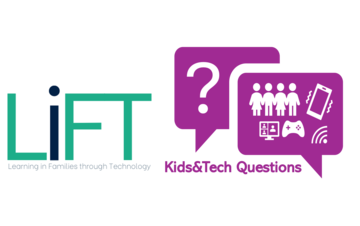Kids and Tech Questions
Information sheet for parents / guardians

This information sheet is for parents of children who are participating in the project via their school only.
If you would like more information on the survey for families and educators, see https://liftprojecthub.education.ox.ac.uk/ktq
Central University Research Ethics Committee Approval Reference: EDUC_1360691
In partnership with researchers at the University of Oxford, your child’s school has agreed to take part in a research study investigating what questions children, their parents and educators have about digital technology. We would like to invite your child to be part of this research. We very much hope you would like your child to take part, but before you decide, it is important that you understand why the research is being done and what it will involve.
Why is this research being conducted?
The Kids & Tech Questions project aims to understand what the most important questions that children aged 2 to 11 years, their families and educators have about digital technology and young children. This is important because research priorities are commonly decided by researchers and funding bodies rather than the people who will use the results of the research, including families and educators. The project will include discussions with primary school aged children about their ideas and concerns (the part of the research your child will help with), as well as two surveys with families and educators, to provide questions and rank their importance and a final workshop to create a top list of priority questions to share with researchers and funders.
More information about the research is available on our website.
Why has my child been invited to be involved in this research?
We are inviting your child to take part because they are a young person, aged between 6 and 11 years, attending a school in Sheffield. We are inviting 6-10 young people to take part from each school, with a total of up to 20 children.
Does my child have to be involved?
No. You can ask questions about the research before deciding whether to allow your child to participate. Likewise, your child will receive an age-appropriate explanation of the study and asked for assent to participate, and may change their mind at any time. If you do agree to participation, you may withdraw your child at any time, without giving a reason and without any effect on their education, by advising the school or researchers of this decision. If, for any reason, you wish to exclude your child’s data at a later stage, you may do so by emailing the researcher by the date provided on your school letter, before the data are anonymized. Note that due to audio recording of group discussions, this data cannot be fully withdrawn. If your child is not involved in the research, they will do activities in school as normal.
What will happen if my child takes part?
Children will work with me twice for less than 1 hour. Firstly, they will work in a small group (3 to 5 children) where children will be asked to create something (e.g., a cartoon or poem) to express what a typical day looks like using digital technology. We will reflect on how they use digital technology in their day-to-day lives and share their views with the group. In the second session, pairs of children will discuss the question of what matters to them about digital technology and how it could be improved using use pictures, flashcards and examples. I will record the discussions using a dictaphone. Children who participate will get a sticker.
What are the possible disadvantages and risks in taking part?
There are no major risks to taking part. To avoid any possible discomfort for children, the facilitator will be careful to maintain a respectful discussion amongst children. Before taking part, the facilitator will explain to children what will happen and ask if they wish to take part. If they change their mind at any time, they will be allowed to return to their class. Your child’s input will not be shared with their teacher or school staff. We will ask your child’s teacher to help with group assignment. It may not be possible to work with all children who provide consent.
Are there any benefits in taking part?
While there are no immediate benefits to your child in participating, it is hoped that this research will lead to change in the focus of future research on young children and technology which will be more in line with what is important to children.
What information will be collected and why is the collection of this information relevant for achieving the research objectives?
We are collecting a consent form in order to know who has consented to take part. The consent form you complete will be collected by your child's school. Once transferred to the researcher, they will be kept on their person before storing securely at the researcher's home address. Within 2 months of data collection completion, these will be transferred to a locked filing cabinet at the Department of Education until 3 years following the publication of the data.
We are collecting audio recordings to record what children said during the discussion and to extract the questions they have posed about young children and digital technology. Audio recordings of the discussions will be stored on a dictaphone. Within 2 weeks of data collection completion, these will be backed up on Nexus 365 OneDrive for Business and deleted from the original device. The contents of audio recordings will be transcribed to an Excel spreadsheet stored on Nexus 365 OneDrive for Business with identifying information removed (such as any specific names or places) and will be linked only with the child’s year group. Audio recordings will be retained on Nexus 365 OneDrive for Business until the data analysis is complete.
We will also record the items children make (collages, poems) and written notes during the discussion to help us to find information in the audio recordings. Written notes from discussions and items children make will be kept on the researcher's person before storing securely at the researcher's home address. Within 2 months of data collection completion, these will be transferred to digital format and stored on Nexus 365 OneDrive for Business. Paper copies will be destroyed. Digitised notes will be retained on Nexus 365 OneDrive for Business for 3 years following the publication of the data.
The research team will have access to the research data. Anonymized responses (i.e., a quote with the year group of the child, containing no information linking it to an individual child) will be made available in a public dataset for future research. Images of items children make (e.g. collages) with any personal information removed may be used in academic presentations, publications, or reports.
A summary of our findings will be given to the school and will be available to interested families. I will not identify the school, teacher or any students in any reports of the research.
Will the research be published? Could my child be identified from any publications or other research outputs?
Yes, the overall findings from the research may be written up in academic publications, conference presentations, on our website, and in reports for our funder and other stakeholders. Anonymized responses (i.e., a quote with the year group of the child, containing no information linking it to an individual child) will be made available in a public dataset for future research.
Your child will not be identifiable in these reports or the data set.
Data Protection
The University of Oxford is the data controller with respect to your personal data, and as such will determine how your child’s personal data is used in the research. The University will process your child’s personal data for the purpose of the research outlined above. Research is a task that we perform in the public interest. Further information about your rights with respect to your personal data is available from https://compliance.web.ox.ac.uk/individual-rights.
Who has reviewed this research?
This research has received ethics approval from a subcommittee of the University of Oxford Central University Research Ethics Committee. (Ethics reference: EDUC_1360691).
Who is organising and funding the research?
The lead researcher is Dr Sophie Booton. The research is part of the Learning in Families through Technology (LiFT) project, which is funded by Soremartec.
Who do I contact if I have a concern about the research, or I wish to complain?
If you have a concern about any aspect of this research, please contact Dr Sophie Booton (sophie.booton) or Professor Victoria Murphy (victoria.murphy) @education.ox.ac.uk, and we will do our best to answer your query. We will acknowledge your concern within 10 working days and give you an indication of how it will be dealt with. If you remain unhappy or wish to make a formal complaint, please contact the University of Oxford Research Governance, Ethics & Assurance (RGEA) team at rgea.complaints@admin.ox.ac.uk or on 01865 616480.
What should I do next?
Please fill in the consent form provided by your school and return it to your child’s class teacher if you would like your child to take part in this research. Please remember that you may withdraw your child at any time, without affecting their education and without giving a reason, by notifying the researcher.
Further Information and Contact Details
If you would like to discuss the research with someone beforehand (or if you have questions afterwards), please contact:
Dr Sophie Booton
Department of Education
University of Oxford
Oxford, OX2 6PY
University email: sophie.booton @education.ox.ac.uk



